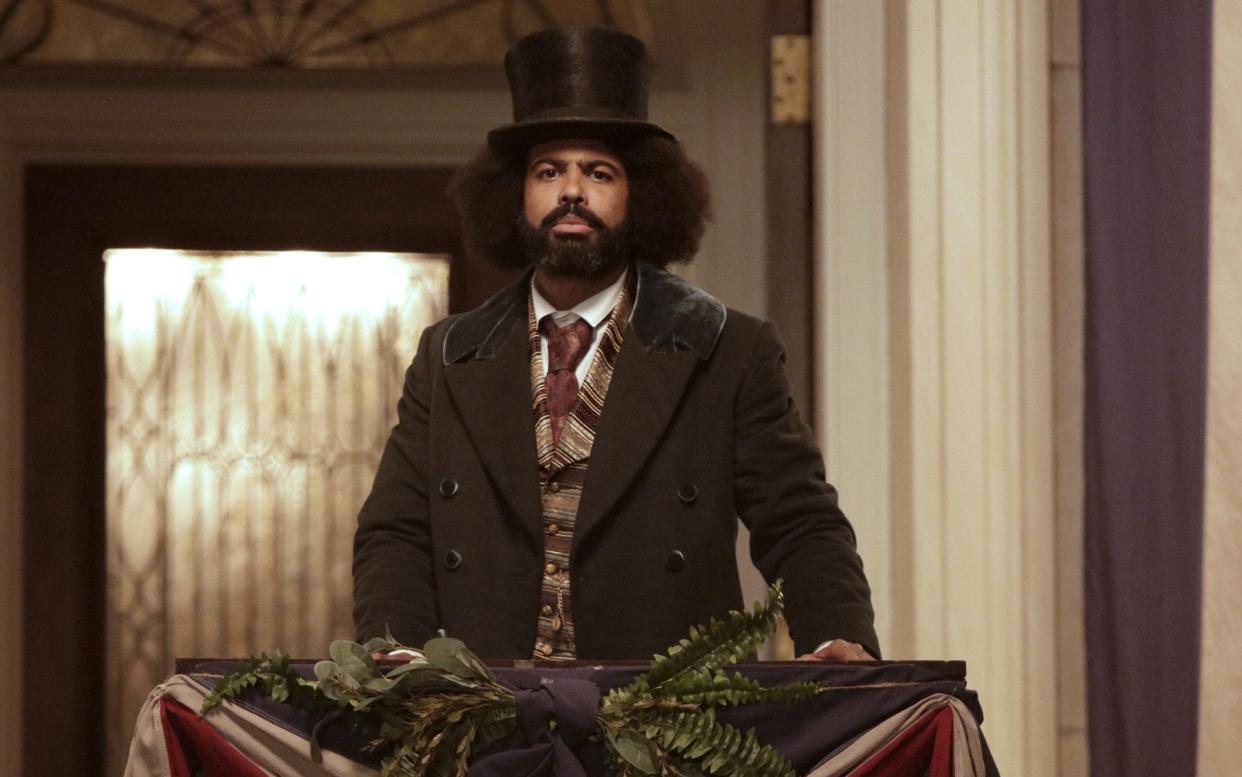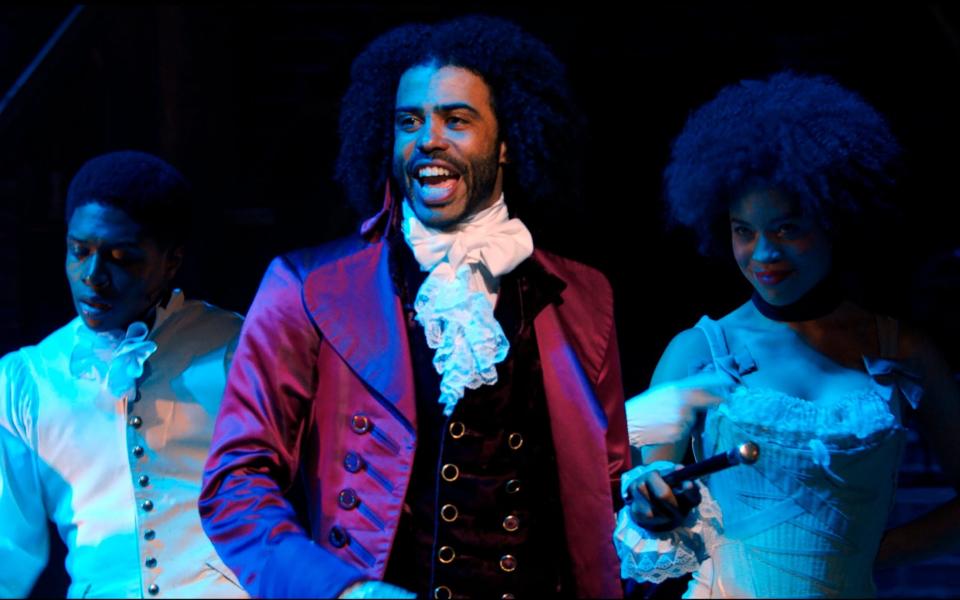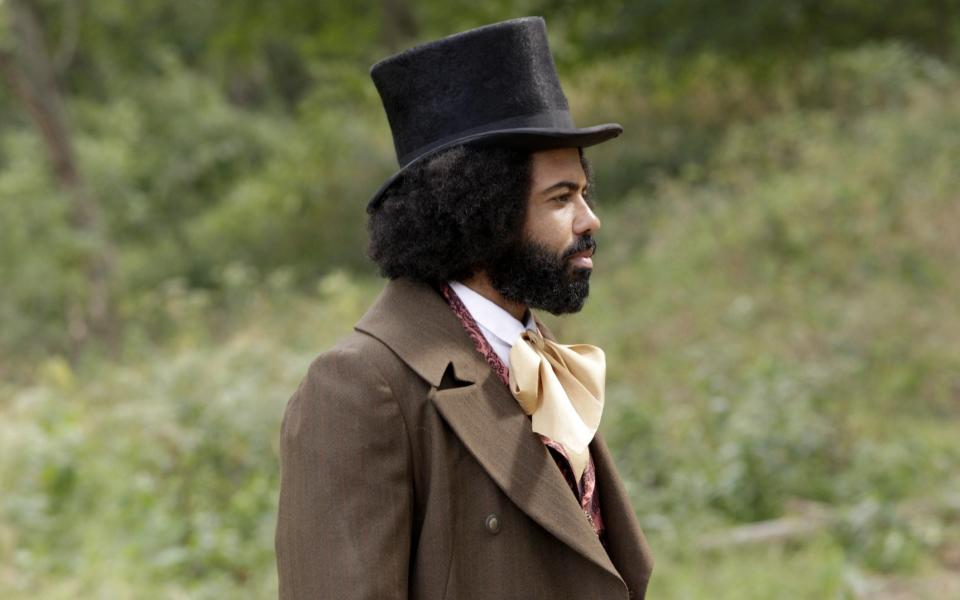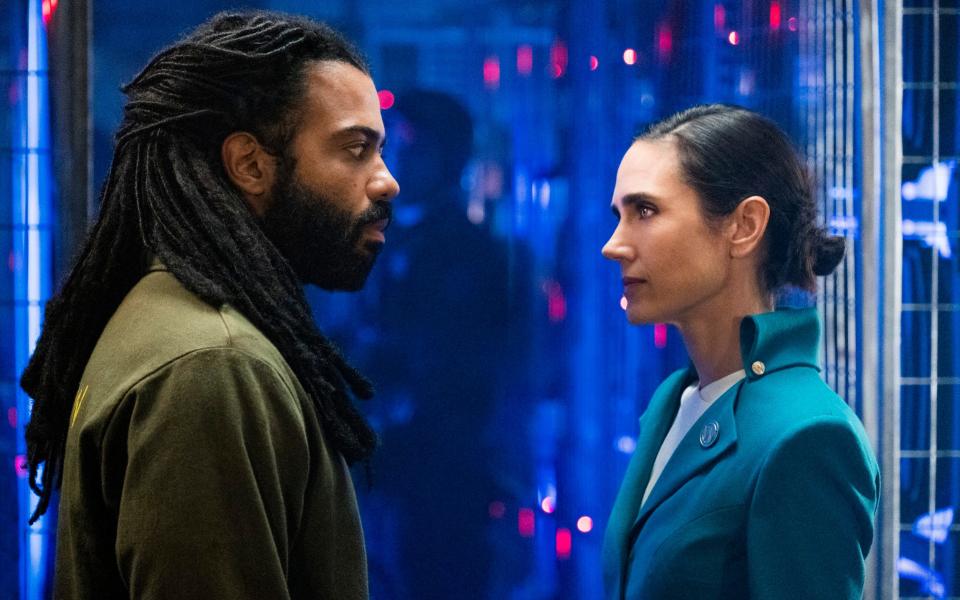Daveed Diggs interview: ‘I thought Hamilton was a terrible idea’

It’s an auspicious day to be talking to the Hamilton star Daveed Diggs, modern originator of two pivotal figures from American political history. “I voted already and I’m [now] doing everything possible today to distract myself,” the Hamilton actor says, his basso chuckle almost vibrating the screen of our video link.
We’re talking on election day in the United States. Diggs is the Los Angeles-residing Californian who first played the roles of American Revolutionary War hero Lafayette and that of third American president Thomas Jefferson in Lin-Manuel Miranda’s blockbuster Broadway musical. When we speak he's back – briefly – in the city that birthed both the 2015 show and Donald Trump.
He can’t speak to the atmosphere in the New York streets this morning, he’s only been out for coffee, “but it’s mostly empty out there. This is my first time here since the shutdown in March, but I hear it’s been like this quite a bit – a lot of people have moved out of the city. It just feels different. But I like it!” he laughs again.
It goes without saying that the 45th occupant of the White House is not so prominent on Diggs’ “like” list. A singer and musician before he was an actor, in the summer the 38-year-old released a song, Chapter 319, with his hip hop trio Clipping. In it he raps: “Donald Trump is a white supremacist, full stop. If you vote for him again, you’re a white supremacist, full stop.”
“I’m intentionally giving you pass on the last time [if you voted Trump in 2016],” he states now, explaining the specifics of those lyrics, “because maybe you didn’t have all the information. But then Charlottesville happened.” At a far right rally in the Virginian city in August 2017, a white supremacist drove his car into the crowd, murdering one counter-protestor and injuring 19 others. President Trump’s response (“very fine people on both sides”) was equivocal to say the least.
“To see our president encouraging white supremacist violence in Charlottesville, and to see people after that still make excuses for him...” Diggs pauses his eloquent flow to grimace. “At that point, he’s not just an apocryphal weirdo with a TV show. He’s the President of the United States and he showed you exactly who he was – and you still supported him. So at that point I have no more sympathy.”

Pleasingly, then, for Diggs, 75 million Americans and billions more worldwide, our conversation has subsequently been overtaken by events. And, as if to stick a televisual cherry on top of Joe Biden’s victory, the vanquishing of a president widely vilified for his stance on race relations is immediately followed by the UK broadcast of The Good Lord Bird.
The US mini-series tells the story of the 19th-century abolitionist John Brown, a firebrand Christian soldier and folk hero credited with helping catalyse the American Civil War. In the critically acclaimed seven-part drama – which inventively delineates this crucial step in the eventual ending of slavery through the eyes of a 13-year-old boy mistaken for a girl (named Onion) – Brown is portrayed with mad-eyed gusto by Ethan Hawke.
In a supporting role as scene-stealing as his portrayal of Hamilton’s Jefferson as a Prince-like rock star, Diggs plays Frederick Douglass. He was the Black statesman and social reformer dubbed by Brown in the show as “King of the Negroes”. Which, actually, for Diggs, makes for a hat-trick of great historical figures.
Doubling down on The Good Lord Bird’s entertaining depiction of an otherwise brutal and pivotal moment in American history, Diggs plays Douglass – at the time, one of the most photographed figures in the world – as a great orator who causes white East Coast gentlefolk to swoon. He also plays him as a pompous, cognac-swigging dandy sharing his home with both a wife and a mistress, and as a man not averse to making a drunken pass at young Onion.
Hagiography this is not, and Diggs credits author James McBride, on whose 2013 novel of the same name the series is based, with the insights allowed by this irreverent approach.
“It was the funniest thing I'd ever read," he recalls of a book handed to him by Hawke backstage at a New York theatre. "The genius of this whole story being told through the lens of this character Onion is that it allows for [Douglass] to be ridiculous. And I think we are,” Diggs says intently. “The most important people are often the most ridiculous. You have to be. You have to have all sides.”
No matter how true-to-the-history-books his version of Douglass may or not be, Diggs views the contemporary resonance as more important.
“There is a humanity to the fact that Douglass is experiencing fame in the way that human beings experience fame. And that doesn’t detract from his brilliance. And it doesn’t have to make him less of an important person. It just allows him to be human.
“Which I think points out [something] for the rest of us,” he adds. "If that person can be great, and that’s a person, then I also can be great, because I am as well a person. Learning about our heroes in a way that allows us to tear them down a little bit actually encourages us all to become heroes.”
That very 2020 relevance is also at play in the ongoing popularity of Hamilton, for which Diggs won a Grammy and a Tony. Broadway and every other theatre in the world may be currently shuttered. But with a filmed version of the show having premiered on streaming service Disney+ early in lockdown, Miranda’s masterful hip hop-flavoured telling of the lives and loves (too many loves) of one of America’s Founding Fathers has found a whole new global audience.
“It is just a great piece of theatre,” is Diggs’ first answer when I ask him to explain the huge pop cultural impact of Hamilton – even as he admits he couldn't see it when a mutual friend of he and Miranda first pitched it: “Hey, we’re doing this little theatre workshop, Lin wrote a new musical, a rap musical about Alexander Hamilton. I said: ‘That’s a terrible idea!’ Then I asked if he would pay me, he said yes, so I said: ‘Yeah, I’ll be there!’”
Joking aside, Diggs quickly saw Miranda’s “smart move, which was not as calculated as sometimes it sounds like in hindsight, because it was really the community of folks that Lin was working with. Recasting the Founding Fathers as brown people is the thing that opens up that story to being for all of us.”
Before that, Diggs admits that “I never felt particularly American. Meaning: I never felt like I had much ownership over American history – my people were brought here by force. It’s not like I felt like I participated in the Revolution in any way!” he says with a wry smile. “But doing that, all of a sudden you’re on stage and you’re watching little brown kids in the audience light up at seeing themselves portraying presidents.”

Diggs’ own galvanising incident was the 2009 shooting, in his own Bay Area neighbourhood, of Oscar Grant by a travel cop (an incident dramatised in 2013’s Fruitvale Station, the debut feature by Black Panther director Ryan Coogler).
“I was living right there that night and we all watched it happen – it was filmed on 50 different cellphones from 50 different angles. And in Oakland we all knew: this is it, this is the moment when nationally people finally look and see what has been happening, and why we have to tell our children to be really careful when police are around.
“There is, finally, undeniable evidence – because Oscar Grant was handcuffed, lying on the ground, and a police officer shot him in the back. And he got off.” That is, Officer Johannes Mehserle was found not guilty of murder and voluntary manslaughter; he was convicted of involuntary manslaughter.
Immediately afterwards Diggs and his writing partner Rafael Casal began writing the film that became Blindspotting, in which Diggs plays a parolee who witnesses the shooting of a Black civilian. After its release in 2018, Barack Obama named the film one of his picks of the year. Diggs and Casal are now working on a spin-off TV series.
Nonetheless, when George Floyd was killed by Minneapolis police in May, Diggs wondered where the 11 years went since the killing of Grant.
“It’s everything I’ve ever said my whole life: this actually has not changed,” he states firmly. That said, “now I’m cautiously bolstered by the fact that there seems to be a real rooting for these things to change [and] some of the ideas of police reform.
“People are starting to pay more attention to the history and understand how the legacy of slavery in this country affects literally everything about this country. But it’s always cautious with me because nothing has changed for the entirety of my life.”

A very different, and infinitesimally less important, caution attends another question for Diggs: his voice role as Sebastian the crab in the upcoming live action version of The Little Mermaid. “I don’t know what I’m allowed to speak on in terms of Disney, so I’m not gonna say anything!” Diggs, laughing again.
In the meantime, there’s the brilliant provocation of The Good Lord Bird to get us through Lockdown 2.0 and the dog days of the Trump presidency. On the one hand, we see Hawke’s John Brown’s brutal putting-to-the-sword of anyone supporting slavery. On the other, we see Frederick Douglass swanning about salons, both lion of heart and hearty of loin.
That complex, contradictory view of the man, again, thinks Diggs, is entirely how it should be. His was an ego big enough to help change the course of history.
“The way Douglass became internationally famous was by telling his own story over and over again, in the form of autobiographies. They became incredibly popular, and they were abolitionist tools to try and end slavery. [He’d say]: ‘Here are the horrors of slavery, I know, I lived through them. I am a brilliant, beautiful, well-spoken Black man who white people love to hang out around!’” Daveed Diggs says, with more laughter. “That was really Fred’s deal!”
The Good Lord Bird begins on Wednesday 17 at 2am and 9pm on Sky Atlantic
